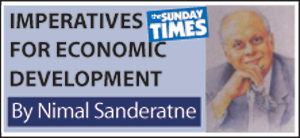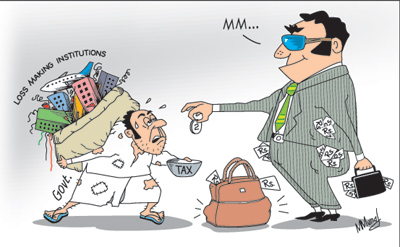Columns
Reducing government expenditure essential to decrease budget deficit
View(s):Last week we pointed out that the fiscal imbalance required a two-pronged strategy of increasing revenue and reducing expenditure.
The foremost challenge in this strategy is to restrain aggregate demand of both government and private sector spending. However, in the current situation, the containment of government expenditure is the principal priority. The curtailment of recurrent expenditure and restraints on capital expenditure are needed to reduce the deficit to an acceptable level.
Revenue collection
Increasing government revenue has become a challenging task. The revenue to GDP ratio has declined from about 15 per cent a few years ago to 11 per cent last year and is below levels of countries with Sri Lanka’s per capita income. Tax avoidance, tax evasion and an inefficient tax administration are important reasons for this shortfall in revenue. The expectation is that tax reforms would significantly reduce past fiscal slippages and increase revenue.

The reform in trade and excise taxes, a broader tax base and more effective tax collection are expected to achieve higher revenue collection that would reduce the fiscal deficit. The Government expects the end of the moratorium on BOI enterprises that began in 1962, full operations of VAT at retail level with a further rationalisation of exemptions, the recent increases in import duties and the normalisation of imports to enhance revenue.
Increasing revenue by raising trade taxes has to be done carefully since it would interfere with private sector incentives to increase exports or lead to inefficient import substitution. One important principle to follow is to have more or less uniform tariffs that are not excessively high with low variance that would be helpful to both increasing revenue and remaining competitive in trade.
The report of the taxation commission led by Prof. W.D. Lakshman that could be the basis of tax reforms has not been made public for some unknown reasons.
Excessive public expenditure
Excessive public expenditure impacts adversely not only on the fiscal balance but the trade balance as well. Increasing revenue to cope with escalating public expenditure is not realistic in the current year and in 2014. Therefore while increasing revenue is vital, decreasing government spending is an urgent need. It is the difficulty of containing government expenditure that makes the containment of the fiscal deficit a daunting task but an immediate necessity.
Pruning government expenditure has proven particularly difficult over many years. There appears to be a mistaken view that the Government has inexhaustible funds for expenditure. The fundamental premise on which economic management rests is that resources are scarce. To ignore this is to generate inflationary pressures, high debt burden and unbearable financial burdens for the future. It could also lead to lower economic growth, as more government spending would mean less access to resources by the private sector that has higher rates of return in most circumstances.
Defence expenditure
During the war years it was recognised that defence expenditure could not be reduced as the defeat of the LTTE was the foremost priority and had to be achieved for enabling the security of the country and as a precondition for development. Therefore, there was an overriding justification for incurring high defence expenditure that in turn led to large fiscal deficits and increasing public debt.
Although there was an expectation of a drastic reduction in defence expenditure after the war ended, there has not been a curtailment of defence expenditure. The inability to reduce defence expenditure is a complex issue. In the initial year or two after the war ended there were outstanding payments for armament supplies. Then a curtailment of expenditure on army personnel was not possible and salaries for defence personnel increased rather than reduced.

The economics of defence expenditure is further obscured as the armed forces are performing civilian developmental functions. This deployment of army personnel for construction work and infrastructure improvement has a rationale after a war that required large numbers to be employed. Since they cannot be discontinued nor kept idle they have to be economically deployed. Therefore, the high expenditure has an economic rationale, even though excessive use of armed forces has serious political implications in a democratic state and some of these expenditures could directly compete with public sector commercial activities.
Furthermore, the Defence Ministry budget is coupled with the Urban Development Ministry that is undertaking a large programme of infrastructure improvement and development. While these expenditures can be justified, the fact is that the large expenditure is a strain on the public finances and a contributory factor for the large government expenditure. Furthermore some of this expenditure may not be a priority in the current state of public finances.
Other expenditure
There are several other reasons too that make it difficult to prune public expenditure. The huge debt servicing costs that are the highest item of public expenditure is a fundamental weakness in the finances of the country. It is not possible to reduce this expenditure without reducing the public debt that is increasing. The reduction of the public debt as a percentage of GDP is hardly helpful in reducing the massive debt servicing cost, as it gobbles the entirety of annual revenue.
Bringing down government expenditure is difficult due to the rigidity of most government expenditure. The large expenditure on public service salaries and pensions, big losses in public enterprises, and expenditure on subsidies and welfare are difficult and practically impossible to reduce. The reduction of the large unproductive conspicuous state consumption requires an understanding of the grave fiscal situation and a serious resolve to be prudent in government expenditure. This is regrettably lacking despite the official commitment to decrease such spending.
The losses incurred by public enterprises have also to be reduced to make a dent in public expenditure. Without reforms of these public enterprises important means of expenditure cuts would be unavailable even though the price revisions are likely to reduce their losses.
Public expenditure on salaries of public servants and pensions that are a huge expenditure cannot be reduced. However efforts must be made to not increase these expenditures due to salary increases and further recruitment. This too is no easy task in the face of inflation and increasing unemployment among educated youth and political compulsions. The huge recruitment to the public sector in the last few years, though adding to GDP growth, is of doubtful productivity.
Reducing deficit imperative
Despite these formidable difficulties the reduction of the deficit to around 5 per cent of GDP is vital to ensure economic stability. Recognition of this by the political leadership is vital to ensure a political will to reduce government consumption. The urgency of fiscal consolidation is such that even some economically justified expenditure may have to be curtailed, phased out or postponed to reduce government expenditure.
At this time of preparing the Budget for 2014 there has to be well-planned efforts to increase revenue by effective taxation.
While the public bears high costs and expenditures in payments for various services, little of such earnings appear to come in as revenue. Given the weak tax collection administration, taxes that are easy to collect and fall on the affluent is vital. The inability to collect taxes from the rich and excessive public expenditures have led to regressive measures of taxation as the continuous increases in basic items of expenditure on the spurious ground of increasing domestic consumption.
A strong resolve to reduce tax evasion coupled with a determination to reduce unproductive government expenditure are needed to achieve a significant fiscal deficit.
comments powered by Disqus
